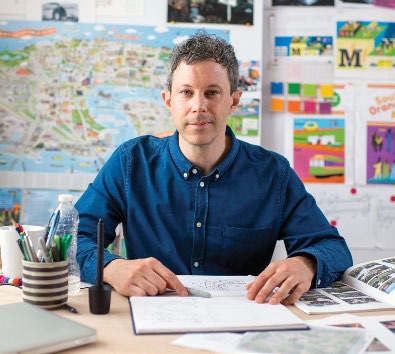
John D. and Catherine T. MacArthur Foundation
When designer and urban planner Damon Rich ’97 received the call from the John D. and Catherine T. MacArthur Foundation telling him he’d been awarded one of this year’s 24 fellowships, he didn’t pick up the phone.
“These days, you don’t really answer strange numbers,” he says with a laugh. “The number kept coming so eventually I picked up, and it started like all those calls you wish you hadn’t picked up: ‘Congratulations!’” Weeks later, Rich says receiving the award still feels “pretty unreal.”
The MacArthur fellowships, also known as “genius grants,” award each recipient $625,000, paid quarterly over five years, as “seed money for intellectual, social and artistic endeavors.” The foundation lauded Rich’s “vivid and witty strategies to design and build places that are more democratic and accountable to their residents.” The award has no reporting requirements and no applications; because nominations are made to the foundation confidentially, Rich does not know who suggested him. “[I] have to treat everyone as though they are my guardian angel,” he says.
Rich is a co-founder and partner at Hector, an urban design, planning and civic arts studio in Newark, N.J., and is also an adjunct associate professor at the Architecture School. “In architecture [the fellowship] has always been a huge deal,” he says. “When I was in school, Liz Diller and Rick Scofidio [of the firm Diller Scofidio + Renfro] were recipients, and the message was: ‘You can see that architecture is important because they got this award.’”
After working in the public sector as chief urban designer and director of planning for the city of Newark from 2008 to 2015, Rich has found that Hector’s work in the private sector can have its difficulties. “Having the ability to put together complex clients and coalitions that actually produce the most beautiful and interesting work is a little more challenging,” he says. “So the foundation support is a dose of freedom as we try to figure out how to make those coalitions work. They are critical to the kinds of success that we and the people we work with want to see.”


